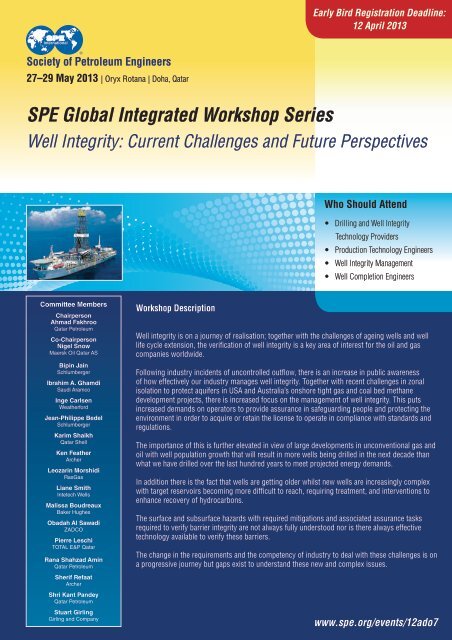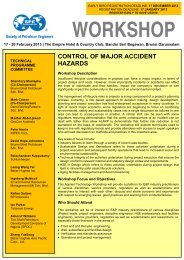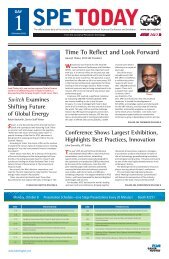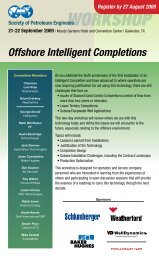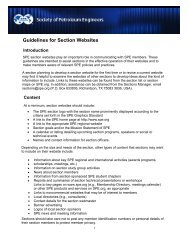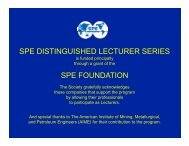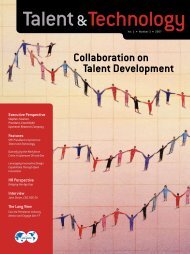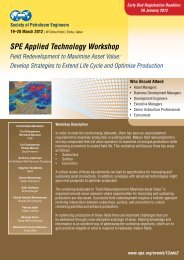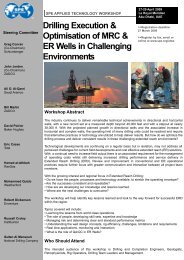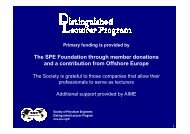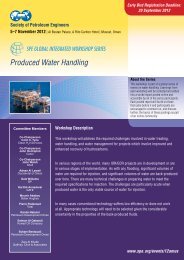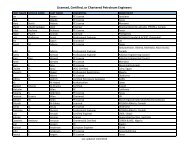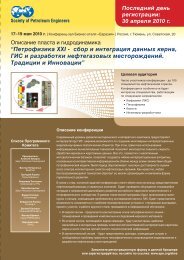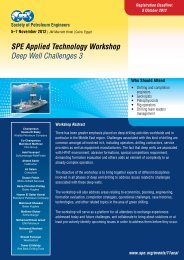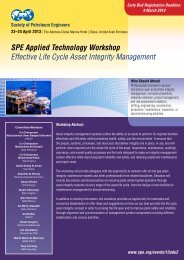Workshop Brochure - Society of Petroleum Engineers
Workshop Brochure - Society of Petroleum Engineers
Workshop Brochure - Society of Petroleum Engineers
Create successful ePaper yourself
Turn your PDF publications into a flip-book with our unique Google optimized e-Paper software.
Early Bird Registration Deadline:<br />
12 April 2013<br />
<strong>Society</strong> <strong>of</strong> <strong>Petroleum</strong> <strong>Engineers</strong><br />
27–29 May 2013 | Oryx Rotana | Doha, Qatar<br />
SPE Global Integrated <strong>Workshop</strong> Series<br />
Well Integrity: Current Challenges and Future Perspectives<br />
Who Should Attend<br />
• Drilling and Well Integrity<br />
Technology Providers<br />
• Production Technology <strong>Engineers</strong><br />
• Well Integrity Management<br />
• Well Completion <strong>Engineers</strong><br />
Committee Members<br />
Chairperson<br />
Ahmad Fakhroo<br />
Qatar <strong>Petroleum</strong><br />
Co-Chairperson<br />
Nigel Snow<br />
Maersk Oil Qatar AS<br />
Bipin Jain<br />
Schlumberger<br />
Ibrahim A. Ghamdi<br />
Saudi Aramco<br />
Inge Carlsen<br />
Weatherford<br />
Jean-Philippe Bedel<br />
Schlumberger<br />
Karim Shaikh<br />
Qatar Shell<br />
Ken Feather<br />
Archer<br />
Leozarin Morshidi<br />
RasGas<br />
Liane Smith<br />
Intetech Wells<br />
Malissa Boudreaux<br />
Baker Hughes<br />
Obadah Al Sawadi<br />
ZADCO<br />
Pierre Leschi<br />
TOTAL E&P Qatar<br />
Rana Shahzad Amin<br />
Qatar <strong>Petroleum</strong><br />
Sherif Refaat<br />
Archer<br />
Shri Kant Pandey<br />
Qatar <strong>Petroleum</strong><br />
Stuart Girling<br />
Girling and Company<br />
<strong>Workshop</strong> Description<br />
Well integrity is on a journey <strong>of</strong> realisation; together with the challenges <strong>of</strong> ageing wells and well<br />
life cycle extension, the verification <strong>of</strong> well integrity is a key area <strong>of</strong> interest for the oil and gas<br />
companies worldwide.<br />
Following industry incidents <strong>of</strong> uncontrolled outflow, there is an increase in public awareness<br />
<strong>of</strong> how effectively our industry manages well integrity. Together with recent challenges in zonal<br />
isolation to protect aquifers in USA and Australia’s onshore tight gas and coal bed methane<br />
development projects, there is increased focus on the management <strong>of</strong> well integrity. This puts<br />
increased demands on operators to provide assurance in safeguarding people and protecting the<br />
environment in order to acquire or retain the license to operate in compliance with standards and<br />
regulations.<br />
The importance <strong>of</strong> this is further elevated in view <strong>of</strong> large developments in unconventional gas and<br />
oil with well population growth that will result in more wells being drilled in the next decade than<br />
what we have drilled over the last hundred years to meet projected energy demands.<br />
In addition there is the fact that wells are getting older whilst new wells are increasingly complex<br />
with target reservoirs becoming more difficult to reach, requiring treatment, and interventions to<br />
enhance recovery <strong>of</strong> hydrocarbons.<br />
The surface and subsurface hazards with required mitigations and associated assurance tasks<br />
required to verify barrier integrity are not always fully understood nor is there always effective<br />
technology available to verify these barriers.<br />
The change in the requirements and the competency <strong>of</strong> industry to deal with these challenges is on<br />
a progressive journey but gaps exist to understand these new and complex issues.<br />
www.spe.org/events/12ado7
WORKSHOP<br />
Well Integrity: Current Challenges and Future Perspectives<br />
Sponsorship Support<br />
Sponsorship support helps <strong>of</strong>fset the<br />
cost <strong>of</strong> producing workshops and allows<br />
SPE to keep the attendance price within<br />
reach <strong>of</strong> operations-level individuals,<br />
those who benefit most from these<br />
technical workshops.<br />
Sponsors benefit both directly and<br />
indirectly by having their names<br />
associated with a specific workshop<br />
While SPE prohibits any type <strong>of</strong><br />
commercialism within the conference<br />
hall itself, the society recognises that<br />
sponsoring companies <strong>of</strong>fer valuable<br />
information to attendees outside the<br />
technical sessions.<br />
Sponsorship Categories<br />
Sponsorships are <strong>of</strong>fered on a first<br />
come basis. Please contact SPE to<br />
verify the availability <strong>of</strong> a particular<br />
sponsorship. Existing sponsors have<br />
the opportunity to renew the same level<br />
<strong>of</strong> sponsorship for annual workshops<br />
• Gold Sponsorship<br />
• Silver Sponsorship<br />
• Bronze Sponsorship<br />
• Welcome Reception and Dinner<br />
Sponsorship<br />
• Luncheon Sponsorship—Per Day<br />
• C<strong>of</strong>fee Break Sponsorship—Per Day<br />
Sponsorship Benefits<br />
In addition to onsite recognition; SPE<br />
will recognise sponsors on the SPE<br />
website and in all printed material<br />
for the workshop. Based on the<br />
sponsorship selected, sponsoring<br />
companies also receive logo visibility<br />
on promotional workshop items.<br />
For More Information<br />
For a detailed list <strong>of</strong> available<br />
sponsorships, including benefits and<br />
pricing, contact Loreen Nisha, event<br />
manager, at lnisha@spe.org<br />
Gold Sponsor<br />
Monday, 27 May 2013<br />
Silver Sponsor<br />
1600–1700 hours Final Committee Meeting<br />
1700–1800 hours Speaker/Session Chair Meeting<br />
1800–1900 hours Registration<br />
1900–2100 hours <strong>Workshop</strong> Reception and Dinner for all Delegates<br />
Tuesday, 28 May 2013<br />
0700–0800 hours Registration and Welcome C<strong>of</strong>fee Break<br />
0800–0830 hours Opening Remarks<br />
Bronze Sponsor<br />
0830–1000 hours Session 1: Well Integrity Challenges in Qatar—Case Histories<br />
Session Chairs: Ahmad Fakhroo, Qatar <strong>Petroleum</strong>; Pierre Leschi, TOTAL E&P Qatar<br />
In Qatar, several operators deal with oil and gas productions from both onshore and <strong>of</strong>fshore field developments. This session<br />
will provide a well integrity overview from these oil and gas companies (Qatar <strong>Petroleum</strong>, Maersk Oil Qatar AS, Shell, TOTAL,<br />
Occidental, etc.). Discussing actual well integrity case histories and work practices implemented by others will improve the<br />
overall management <strong>of</strong> the integrity <strong>of</strong> one’s wells.<br />
1000–1030 hours Morning C<strong>of</strong>fee Break and Posters<br />
1030–1200 hours Session 2: Well Integrity Challenges International—Breakout Session<br />
Session Chairs: Ahmad Fakhroo, Qatar <strong>Petroleum</strong>; Liane Smith, Intetech Wells;<br />
Pierre Leschi, TOTAL E&P Qatar<br />
Following the first session, hearing what well integrity challenges the local Qatari operators are facing, a breakout session will<br />
highlight the issues that arise in operations in the region. This session will focus on specific technical challenges that operators<br />
face. Do you share the same problems <strong>of</strong> this region or have some unique challenges? Do you operate ageing wells that are<br />
past their design life, but still have valuable production levels that demand continued operation, or high technology new wells<br />
that present major difficulties for intervention? Discuss and share your experience as the pooled list <strong>of</strong> challenges sets the<br />
scene not only for this workshop, but for the entire global series.<br />
1200–1300 hours Luncheon/Prayer Time and Posters<br />
Audio-Visual Equipment<br />
Sponsor<br />
1300–1430 hours Session 3: Barriers Verification<br />
Session Chairs: Rana Shahzad Amin, Qatar <strong>Petroleum</strong>; Stuart Girling, Girling and Company<br />
Having competent barriers is a fundamental imperative <strong>of</strong> well integrity. In developing a barrier philosophy, consideration must<br />
be given to barrier envelopes and the individual barrier elements that make them up; which <strong>of</strong> these are safety critical and how<br />
their performance is managed; when some leakage is acceptable and whether different components can have different leak<br />
criteria. In reality few wells go through their operating life without material degradation, component failures or human error<br />
featuring. Because <strong>of</strong> this, the use <strong>of</strong> contingent (secondary, tertiary etc.) barriers is necessary in case failures happen. We<br />
also test, monitor, verify, and maintain barrier elements to minimise the likelihood <strong>of</strong> such failures and the resultant impact.<br />
However, standards are not the same across the industry as there are different regulatory regimes, variable understanding, and<br />
differing attitudes to risk. This session will encourage delegates to explain how barriers are managed in their own companies<br />
and to think about philosophy, standards, and practices related to barrier management.<br />
1430–1500 hours Afternoon C<strong>of</strong>fee Break and Posters<br />
SAVE USD 450<br />
BY REGISTERING<br />
BEFORE<br />
12 APRIL 2013<br />
1500–1630 hours Session 4: Risk Assessment—How to Manage Wells with Imperfect Barriers<br />
Session Chair: Karim Shaikh, Qatar Shell; Ken Feather, Archer<br />
Components fail in most wells resulting in imperfect barriers. Good designs, incorporating contingent barriers, can mitigate<br />
this, though even with such in-built safeguards, failures, and imperfect barriers introduce risks that need assessment and<br />
management. Traditionally, well integrity risk assessments have been done reactively, in response to an actual failure. The<br />
industry is using the concept <strong>of</strong> well failure models increasingly to consider failures that have not yet happened and determine<br />
actions to be taken should they occur. The recently published OGP describes the concept <strong>of</strong> well failure models and encourages<br />
their use to streamline the risk assessment process. A well failure model is, typically, a matrix that identifies the most common<br />
modes <strong>of</strong> failure with consideration for escalation to multiple failures, since the combined result <strong>of</strong> simultaneous failures<br />
can be more severe than failures occurring separately. Each mode <strong>of</strong> failure has an associated action plan and response time<br />
to repair; whether it is permissible to operate, close in or suspend a well during this period. The approach enables proper<br />
management <strong>of</strong> equipment, spares, resources, and contracts to meet the response times specified and is useful to categorise<br />
failures for the purpose <strong>of</strong> prioritisation and reporting. Some examples <strong>of</strong> well failure models will be presented and delegates<br />
will be encouraged to discuss the merits and pitfalls <strong>of</strong> this approach in comparison with other forms <strong>of</strong> risk assessment.
www.spe.org/events/12do7<br />
Wednesday, 29 May 2013<br />
0730–0800 hours Welcome C<strong>of</strong>fee Break<br />
0800–0930 hours Session 5: Well Abandonment—Securing and Restoring Well Integrity in a<br />
Long-Term Perspective<br />
Session Chairs: Inge Carlson, Weatherford; Jean-Phillipe Bedel, Schlumberger<br />
The increasing number <strong>of</strong> ageing wells reaching the end <strong>of</strong> their design lives and the need for final<br />
abandonment is a growing concern in the industry. The <strong>of</strong>ten uncertain status <strong>of</strong> existing well barriers is a<br />
challenge to both intervention safety and as a continued component <strong>of</strong> a permanent secured well. The original<br />
chemical and mechanical design envelopes <strong>of</strong> the well infrastructure need to be assessed and understood<br />
along with the degradation mechanisms. The <strong>of</strong>ten dynamic production history <strong>of</strong> the well may lead to tubular<br />
corrosion, well component wear, and fatiguing thermal loads. External casing corrosion from shallow aquifers<br />
is, to a considerable challenge but with few inspection and repair options. Also, potential deeper formation<br />
disturbance resulting from reservoir production activities need to be carefully assessed. Many fields are in<br />
a rejuvenation phase and continued production from neighbour wells may also interfere with the remaining<br />
infrastructure <strong>of</strong> the abandoned well. Even operations in other fields may recharge hydrocarbon flows if the<br />
formations are connected. Examples from the North Sea include challenges with tubular collapse and even<br />
parted casing strings restricting further reservoir access for the plugging and abandonment (P&A) phase.<br />
Assuring well integrity and securing reservoir access are key issues for many <strong>of</strong> these <strong>of</strong>fshore P&A projects.<br />
Both new diagnostic tools and cost efficient rig solutions and downhole repair tools are high on the wish<br />
list. Understanding the dynamics <strong>of</strong> the subsurface is a key requirement for plugging material selection<br />
and qualification processes. The regulators on the Norwegian continental shelf focus a lot on the status <strong>of</strong><br />
temporary abandoned wells and make higher demands for risk assessment and compliance with the safety<br />
regulations. This workshop session will present current global experiences, and discuss other perspectives <strong>of</strong><br />
well integrity in the context <strong>of</strong> safe well abandonment.<br />
0930–1000 hours Morning C<strong>of</strong>fee Break and Posters<br />
1000–1130 hours Session 6: Technology Gaps<br />
Session Chairs: Bipin Jain, Schlumberger; Karim Shaikh, Qatar Shell<br />
As we all strive to reach a point where we can manage the integrity <strong>of</strong> our whole well stock, while satisfying<br />
both our internal and external standards, guidelines, recommended practices for the whole well life cycle, will<br />
have gaps. These gaps may be technology gaps, failings in well or equipment design or application, gaps in our<br />
processes or gaps in our own understanding and knowledge <strong>of</strong> the complex issues that we face.<br />
This session will explore some <strong>of</strong> these gaps by example, and discuss possible ways in which these gaps could<br />
be filled. These gaps will form the basis <strong>of</strong> an active discussion with new ideas and concepts being brought to<br />
the table.<br />
1130–1230 hours Luncheon/Prayer Time and Posters<br />
1230–1400 hours Session 7: Automating the Management <strong>of</strong> Well Integrity Data<br />
Session Chairs: Leozarin Morshidi, RasGas; Nigel Snow, Maersk Oil Qatar AS<br />
Automating well integrity data requires solving the issue <strong>of</strong> consolidating data in one place and then automating<br />
its evaluation in order to achieve a consistent approach to the decisions taken when faced with specific well<br />
data. In an ideal situation, an integrated data management system provides decision support which can be<br />
tailored to match ISO requirements and any local policies or regulations in different regions. This session<br />
explores how well integrity data review can be automated and how it can achieve consistent treatment <strong>of</strong> data<br />
and identification <strong>of</strong> well problems through approaches like a built-in well failure model, exception based<br />
surveillance, and other concepts embodied within the new ISO standard for well integrity management.<br />
1400–1430 hours Afternoon C<strong>of</strong>fee Break and Posters<br />
1430–1600 hours Session 8: What are the Priorities for Well Integrity Data Management?—<br />
Breakout Session<br />
Session Chairs: Leozarin Morshidi, RasGas; Liane Smith, Intetech Wells;<br />
Nigel Snow, Maersk Oil Qatar AS; Stuart Girling, Girling and Company<br />
At the heart <strong>of</strong> analysing any well integrity problem is access to data. We all have faced experiences <strong>of</strong> unreliable<br />
and incomplete data being stored in separate silos. Great effort is required to pull it all together. There is a<br />
revolution in data management technology, and systems which support well integrity data management already<br />
exist. But what do we expect these systems to provide? What is the minimum specification for a useful data<br />
system? What are the essential aspects and the nice-to-have extras? Where do we want to push this technology<br />
in the future? Share your thoughts and ideas, and discuss potential implementation challenges with others in<br />
today’s breakout session<br />
1600–1615 hours <strong>Workshop</strong> Closing Remarks<br />
General Information<br />
<strong>Workshop</strong> Venue<br />
Oryx Rotana<br />
P.O. Box 29922, Doha, Qatar<br />
Tel: +974.4402.3333 | Fax: +974.4402.3300<br />
Web: www.rotana.com<br />
<strong>Workshop</strong> Guidelines<br />
Format<br />
Two (2) days <strong>of</strong> informal discussions prompted by<br />
selected keynote presentations and discussions.<br />
<strong>Workshop</strong>s maximise the exchange <strong>of</strong> ideas among<br />
attendees and presenters through brief technical<br />
presentations followed by extended Q&A periods.<br />
Focused topics attract an informed audience eager to<br />
discuss issues critical to advancing both technology<br />
and best practices. The majority <strong>of</strong> the presentations<br />
are in the form <strong>of</strong> case studies, highlighting engineering<br />
achievements, and lessons learnt. In order to stimulate<br />
frank discussion, no proceedings are published and the<br />
press is not invited to attend.<br />
Breakout Sessions<br />
Attendees will be assigned to discussion groups on a<br />
random basis for the breakout sessions to maximise the<br />
opportunity to interact with other participants.<br />
Documentation<br />
• Proceedings will not be published; therefore, formal<br />
papers and handouts are not expected from<br />
speakers.<br />
• Work in progress, new ideas, and interesting<br />
projects are sought.<br />
• Pr<strong>of</strong>essionally-prepared visual-aids are not required;<br />
PowerPoint presentations are most commonly used.<br />
• Note-taking by participants is encouraged.<br />
Attendance<br />
Registrations will be accepted on a first-come, first-serve<br />
basis. The Steering Committee encourages attendance<br />
from those who can contribute to the workshop most<br />
effectively either in discussions or with posters. A mix <strong>of</strong><br />
attendees in terms <strong>of</strong> geographic origin, companies, and<br />
disciplines will be encouraged.<br />
<strong>Workshop</strong> Deliverables<br />
• The Steering Committee will appoint a “scribe”<br />
to record the discussions and to produce the full<br />
workshop report for SPE.<br />
• This report will be circulated to all attendees as the<br />
workshop deliverable within 4–6 weeks following the<br />
workshop. The copyright <strong>of</strong> the report is with SPE.<br />
• PowerPoint presentation materials will be posted<br />
on a specific SPE URL address after the workshop.<br />
Provision <strong>of</strong> the materials by the speakers will signify<br />
their permission for SPE to do so.<br />
Commercialism<br />
In keeping with workshop objectives and the SPE<br />
mission, commercialism in posters or presentations will<br />
not be permitted. Company logos must be limited to the<br />
title slide and used only to indicate the affiliation <strong>of</strong> the<br />
presenter and others involved in the work.<br />
Attendance Certificate<br />
All attendees will receive an attendance certificate<br />
attesting to their participation in the workshop. This<br />
certificate will be provided in exchange for a completed<br />
<strong>Workshop</strong> Questionnaire.<br />
Continuing Education Units<br />
Attendees at this workshop qualify for SPE Continuing<br />
Education Units (CEU) at the rate <strong>of</strong> 0.1 CEU per hour <strong>of</strong><br />
the workshop.
REGISTRATION FORM<br />
Well Integrity: Current Challenges and Future Perspectives<br />
27–29 May 2013 | Oryx Rotana | Doha, Qatar<br />
Important: Attendance is limited and is not guaranteed. Early registration is recommended. Please print or type in black ink.<br />
Registration Fee MUST be paid in advance for attending the workshop.<br />
First Name/Forename__________________________________________________ Middle Name___________________________________________________<br />
Last/Family Name________________________________________________________________________________________ SPE Member? ❒ Yes ❒ No<br />
Member No.__________________________________________ Job Title_____________________________________________________________________<br />
Company/Organisation_______________________________________________________________________________________________________________<br />
Street or P.O. Box Number_____________________________________________________________________ City___________________________________<br />
State/Province___________________________________ Zip/Postal Code___________________________ Country___________________________________<br />
Telephone____________________________________________ Facsimile<br />
Email (required)____________________________________________________________________________________________________________________<br />
<strong>Workshop</strong> Fee: Before 12 April 2013 ❒ USD 1,150 for SPE Members ❒ USD 1,350 for Nonmembers<br />
WORKSHOP<br />
After 12 April 2013 ❒ USD 1,600 for SPE Members ❒ USD 1,800 for Nonmembers<br />
<strong>Workshop</strong> Fee includes: Technical sessions, c<strong>of</strong>fee breaks, luncheons, and welcome reception (if applicable).<br />
Accommodation is NOT included in the workshop registration fee.<br />
IMPORTANT: All SPE Middle East rates are net <strong>of</strong> taxes. The fees in this form do not include any local or withholding taxes. All such taxes will be added to<br />
the invoice.<br />
Do you wish to present a poster? (subject to selection) ❒ Yes ❒ No<br />
Do you wish to be considered a Discussion Leader? (subject to selection) ❒ Yes ❒ No<br />
If yes, please indicate which subject you would like to present on: _______________________________________________________________________<br />
Credit Card (Check One): ❒ American Express ❒ MasterCard ❒ Visa<br />
NO REFUNDS will be granted on cancellations on or after 20 May 2013.<br />
Card Number (will be billed through <strong>Society</strong> <strong>of</strong> <strong>Petroleum</strong> <strong>Engineers</strong>) Expiration Date (mm/yy) Security Code<br />
Name <strong>of</strong> Credit Card Holder (printed) _________________________________________________________________________________________________<br />
Signature (required)___________________________________________________________________________ Date_______________________________<br />
Please inform us <strong>of</strong> mobility or special dietary needs_____________________________________________________________________________________<br />
Payment by Bank Transfer: IMPORTANT—For reference: Please quote “12ADO7” and name <strong>of</strong> delegate<br />
Make Payment to: HSBC Bank Middle East Ltd, Jebel Ali Branch, P.O. Box 66, Dubai, UAE<br />
Account Name: SPE Middle East DMCC Account Number: 036-217131-100 Swift Code: BBMEAEAD<br />
IBAN Code: AE180200000036217131100<br />
Cancellation and Refund Policy:<br />
• A processing fee <strong>of</strong> USD 100 will be charged for cancellations received before the registration deadline 27 April 2013.<br />
• For cancellations received after the registration deadline, 27 April 2013, 25% refund will be made to the registrant.<br />
• No refund on cancellations received within seven (7) days prior to the workshop date, i.e. on or after 20 May 2013.<br />
• No refund will be issued if a registrant fails to attend the workshop.<br />
Not an SPE Member?<br />
Join SPE when you register and<br />
save money by paying the lower<br />
member registration fee.<br />
A portion <strong>of</strong> your dues is<br />
allocated to a JPT subscription<br />
and is not deductible or refundable.<br />
Visa:<br />
SPE Middle East, North Africa, and India will assist in providing a visa invitation letter, upon request in writing, to confirmed registrants after receiving full payment <strong>of</strong> registration<br />
fees. Visa invitation letters take five days to issue from the date <strong>of</strong> request and it is the course attendee’s responsibility to obtain their own visa. SPE cannot issue the visa nor can we<br />
guarantee it will be obtained.<br />
For questions or additional information contact: Loreen Nisha, event manager, at lnisha@spe.org.<br />
12ADO7<br />
To submit your registration online, please visit the event website at: www.spe.org/events/12ado7.<br />
Alternatively, you can email this form to: formsdubai@spe.org, or fax it to: +971.4.457.3164.


